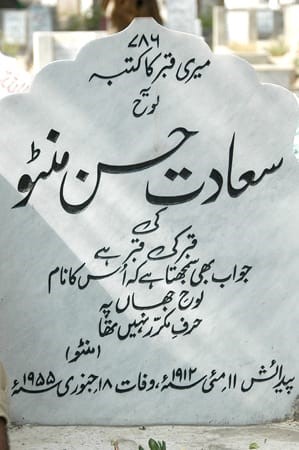Saadat Hasan Manto was born on May 11, 1912, in Ludhiana, Punjab, which was part of British India at the time. Manto moved to Pakistan after the partition in 1947. He was a writer, playwriter, and author.
Early Life:
Saadat Hassan Manto was born in Paproudi village, Samrala, in the Ludhiana district of the Punjab, India, into a Muslim family of barristers on May 11, 1912. He belonged to a Kashmiri trading family. His father, Khwaja Ghulam Hasan, was a session judge of a local court. His mother, Sardar Begum, had Pathan ancestry and was his father’s second wife.
Education:
Manto went to a Muslim high school in Amritsar. He failed the matriculation examination twice there. In 1931, he got admitted to Hindu Sabha College but dropped out due to poor results after the first year. In July 1934, Manto joined Aligarh Muslim University to pursue graduation.
Early Career:
The big turning point in his life came in 1933, at age 21, when he met Abdul Bari Alig, a scholar and polemic writer who encouraged him to find his true talents and read Russian and French authors. Bari also encouraged Manto to translate Victor Hugo’s The Last Day of a Condemned Man into Urdu, which was later published by Urdu Book Stall.
He published his first original story in Urdu, Tamasha (Spectacle), under a pseudonym in Abdul Bari Alig’s Urdu newspaper Khalq (Creation). During this period, he contributed to the daily newspaper Musawat (Equality) and Ehsan (Kindness), both published in Amritsar.
After a brief stay in Amritsar, Manto moved to Lahore in search of employment and joined the Paras newspaper (The Philosopher’s Stone). In 1936, at Lahore, he published his first collection of original short stories, Atish Paray (Nuggets of Fire).
Bombay (Mumbai) and Manto:
In late 1936, he moved to Bombay when he received an invitation to edit the weekly Mussawir. In Bombay, Manto started his work as an editor of Mussawir along with Nazir Ludhianvi and the magazine Samaj (Society). He also started to write dialogues and scripts.
Manto in Delhi:
Dissatisfied with his work, he applied to Krishan Chander for a job with All India Radio in Delhi. Subsequently, he moved to Delhi in January 1941 and accepted the job of writing for the Urdu Service of All India Radio.Meanwhile, due to growing differences with his colleagues at All India Radio, he left his job, returned to Bombay in July 1942, and again started working with the film industry.
Back to Bombay:
Manto returned to Bombay in July 1942 and rejoined as the editor of Musawwir. During this time, he associated with his Aligarh friend Shaheed Latif and his wife, Ismat Chughtai. In 1932, on Latif’s invitation, he joined the Filmistan studio. Here he also formed a friendship with Ashok Kumar and entered his best phase in screenwriting, giving films like Aatth Din, Chal Chal Re Naujawan, and Mirza Ghalib, which was finally released in 1954. He also wrote Shikari. Some of his short stories also came from this phase.
Manto in Pakistan:
As a resident of Bombay, Manto had intended to stay in India after the partition. His wife and children went to Lahore to visit their relatives and friends. During this time, as stories of the atrocities of the partition riots reached him, and during occasional communal riots in Mumbai itself, he decided to migrate to Pakistan.
Life in Lahore:
When Manto arrived in Lahore from Bombay, he associated with several intellectuals in the city. In Lahore, Manto lived with his wife and family in an apartment in the Lakshmi Building, located in Lahore’s famous Lakshmi Chowk (where many film distributors had offices).
Personal Life:
Manto married Safia Begum on April 26, 1939.Their first child, Arif, died at a young age in April 1941 in Delhi. Later, they had three daughters: Nighat Manto, Nuzhat Manto, and Nusrat Manto. His daughter Nighat Bashir lives at Lakshami Mansions, on Beadon Road, where Manto breathed his last.
Charge of Obscenity:

Manto faced trial for obscenity in his writings, three times in British India before 1947 (‘Dhuan,” “Bu,” and “Kali Shalwar”) and three times in Pakistan after 1947 (“Khol Do,” ‘Thanda Gosht’ and ‘Upar Neeche Darmiyaan’) under section 292 of the Indian Penal Code (by the British Government) and the Pakistan Penal Code in Pakistan’s early years. He was fined only in one case.
Regarding the charges of obscenity, he opined, “I am not a pornographer but a story writer.”
Death:
Manto died on January 18, 1955, at Lakshami Mansions, Lahore. His death was attributed to the effects of alcoholism.

Manto is buried in Miani Saheb’s graveyard in Lahore. In 1954, he composed his epitaph:
Here lies Saadat Hasan Manto. With him lie buried all the arts and mysteries of short story writing . . Under tons of earth, he lies, wondering which of the two is the greater short story writer: God or him.
However, on the insistence of his family, it was replaced by an alternative epitaph on his grave, which was also authored by him and inspired by a couplet from Ghalib:
This is the grave of Saadat Hasan Manto, who still thinks his name was not the repeated word on the tablet of time.